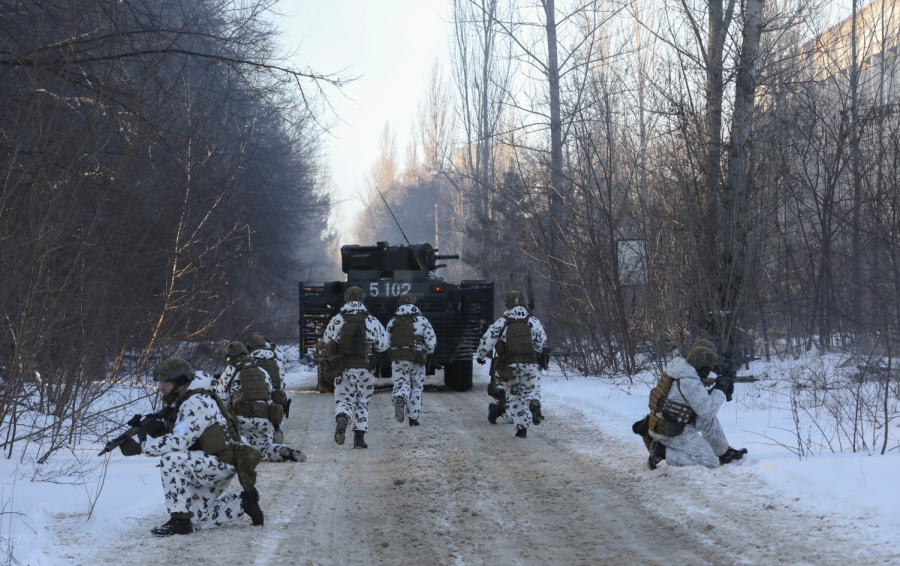Fears of Russian Invasion of Ukraine Spark Discussion over Europe’s Energy Dependency
As Russia has positioned over 130,000 troops along the Ukrainian border and 41 million Ukrainians prepare for a possible Russian offensive, Western diplomacy is working around the clock to safeguard its energy interests while attempting to prevent a large-scale military conflict in Eastern Europe. In fact, while the North Atlantic Treaty Organization (NATO) has highlighted that it will respond cohesively to Russian aggressions against any of its member states, Europe is also concerned with the role Russia will play in regards to the continent’s energy demands. As of 2019, Russia’s natural gas accounted for over 40% of the European Union’s total natural gas imports, while 26% of its crude oil imports also came from Russia, as stated by Eurostat, showing just how delicate this crisis is on multiple fronts. Of course, not all countries have the same energy dependency rates. While some European nations buy very little Russian gas, most of the Eastern bloc is fundamentally tied to it. In the fall of 2021, Russia reduced gas exports to Europe and, consequently, gas prices spiked throughout the continent, showing how much power Russian President Vladimir Putin has over the European Union (EU) and its economy. More importantly, Germany, Europe’s largest economy and a key U.S. partner, is also one of the largest importers of Russian gas, explaining its particularly vague and uncertain attitude toward Russia’s threats over Ukrainian sovereignty and NATO alignment. But while Russia does have the power to affect Europe’s energy flow, a shutdown of its natural gas exports is unlikely to take place due to the economic interdependence between Europe and Russia. The former Soviet country “needs oil and gas revenues at least as much as Europe needs its energy supply. Two-thirds of Russia’s export revenues come from oil and gas,” according to White House Deputy National Security Adviser for International Economics Daleep Singh’s latest comment to NPR.
Analysts seem confident that Putin wouldn’t play such a coercive game in Europe. If Russia were to interrupt the flow of natural gas to the EU, this condition would likely not last long because of the financial value that oil and gas exports play in Russia’s domestic economy. University of Warwick’s Professor Michael Bradshaw, for The Conversation, stated that if the international community were to impose sanctions against Russia, these measures will most likely not target Russian natural gas, promoting its steady and uninterrupted flow.
But because of the uncertainty surrounding Putin’s latest foreign policy, this option cannot be left out. In fact, despite the optimism, contingency plans are being formulated. As highlighted by S&P Global, Russian gas export flows to Slovakia and Germany are down 55% from January 2019, generating fear among European policymakers in regards to what can be done to keep households warm during the winter. “To ensure Europe is able to make it through the winter and spring we expect to be prepared to ensure alternative supplies covering a significant majority of the potential shortfall,” a senior White House official told The Guardian last week. These ‘alternative supplies’ are to be understood as the shipping of liquid gas from a multitude of suppliers to diversify the energy portfolio of Europe while avoiding any potential disruption to the supply chain. In doing so, U.S. officials hope to show Russia how united America and its European allies are against Putin’s compellence while reducing European dependence on such an unpredictable global actor.
Overall, if Russia were to invade Ukraine, the costs for the former Soviet country would be great. During a bilateral meeting with German Chancellor Olaf Scholz last week, U.S. President Joe Biden stated that, “if Russia invades (…) again, then there will be no longer a Nord Stream 2. We will bring an end to it.” Nord Stream 2 is a completed 760 miles long undersea natural gas pipeline that, if cleared for operation, would move 110 billion cubic meters of Russian gas a year to Europe. Despite Biden’s position, “Scholz opted instead for strategic ambiguity about the pipeline’s future in the case of a war,” as pointed out by The Conversation. This strategic ambiguity could pave the way to an uncoordinated response from NATO and its partner states, strengthening Russia’s position and making the U.S. and its allies appear unprepared.
While Western nations are at a diplomatic standstill, Russian President Putin is already speaking with China about increasing its exports of natural gas. This move is one of the many recent hints suggesting Russia’s preparedness against possible international sanctions, and aims at stabilizing Russia’s economy in case of Western retaliation. Although the crisis at the Ukrainian border could change at any moment, the issue of European energy security has been under scrutiny for decades and this could be the right moment to permanently address it.










D. Moschon • Feb 18, 2022 at 10:59 am
Excellent article. Worth seeking out commentary or information from the European Union Delegation to the United States. The diplomatic mission’s Ambasador recently gave an interview on the matter on CBS. Worth a watch.